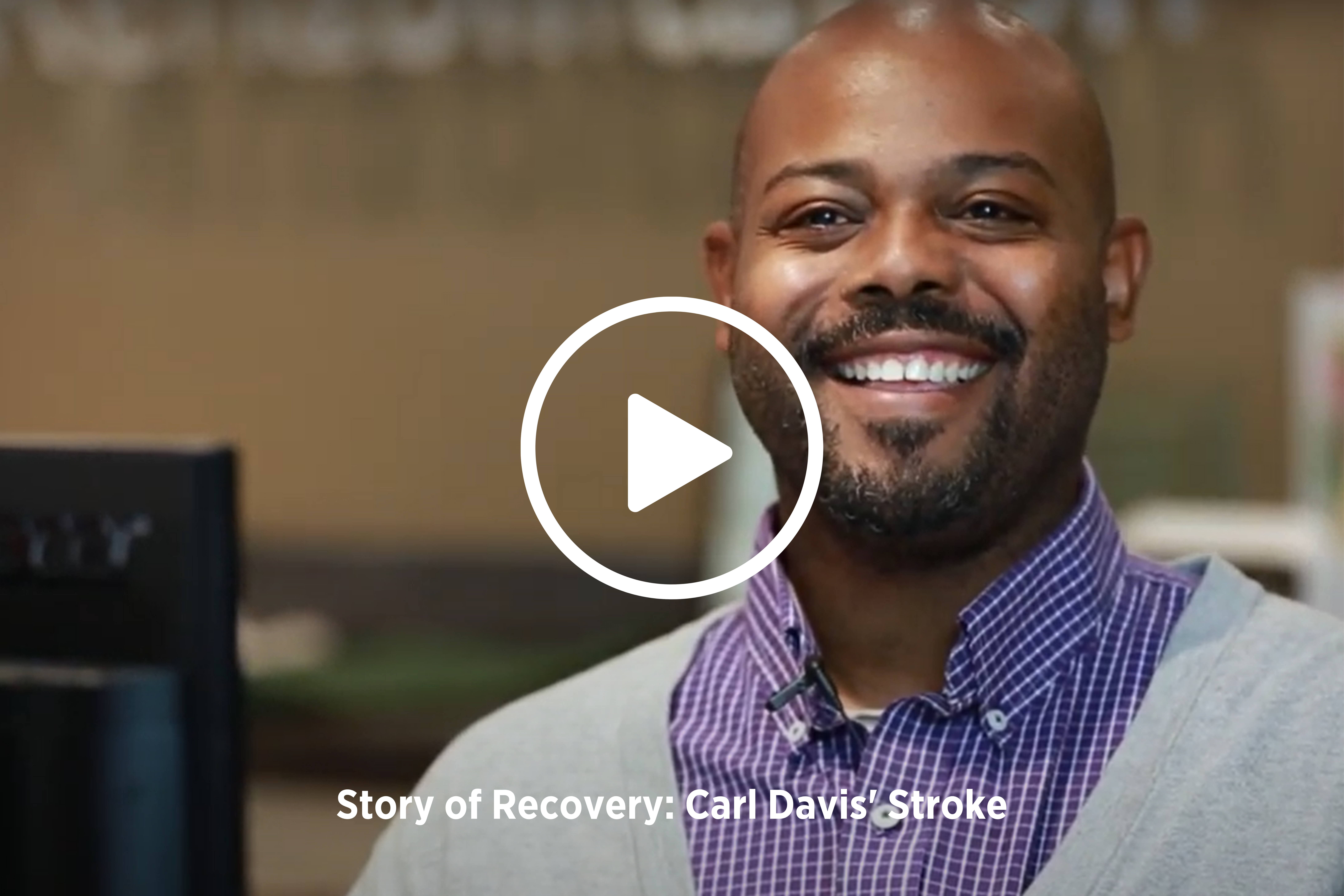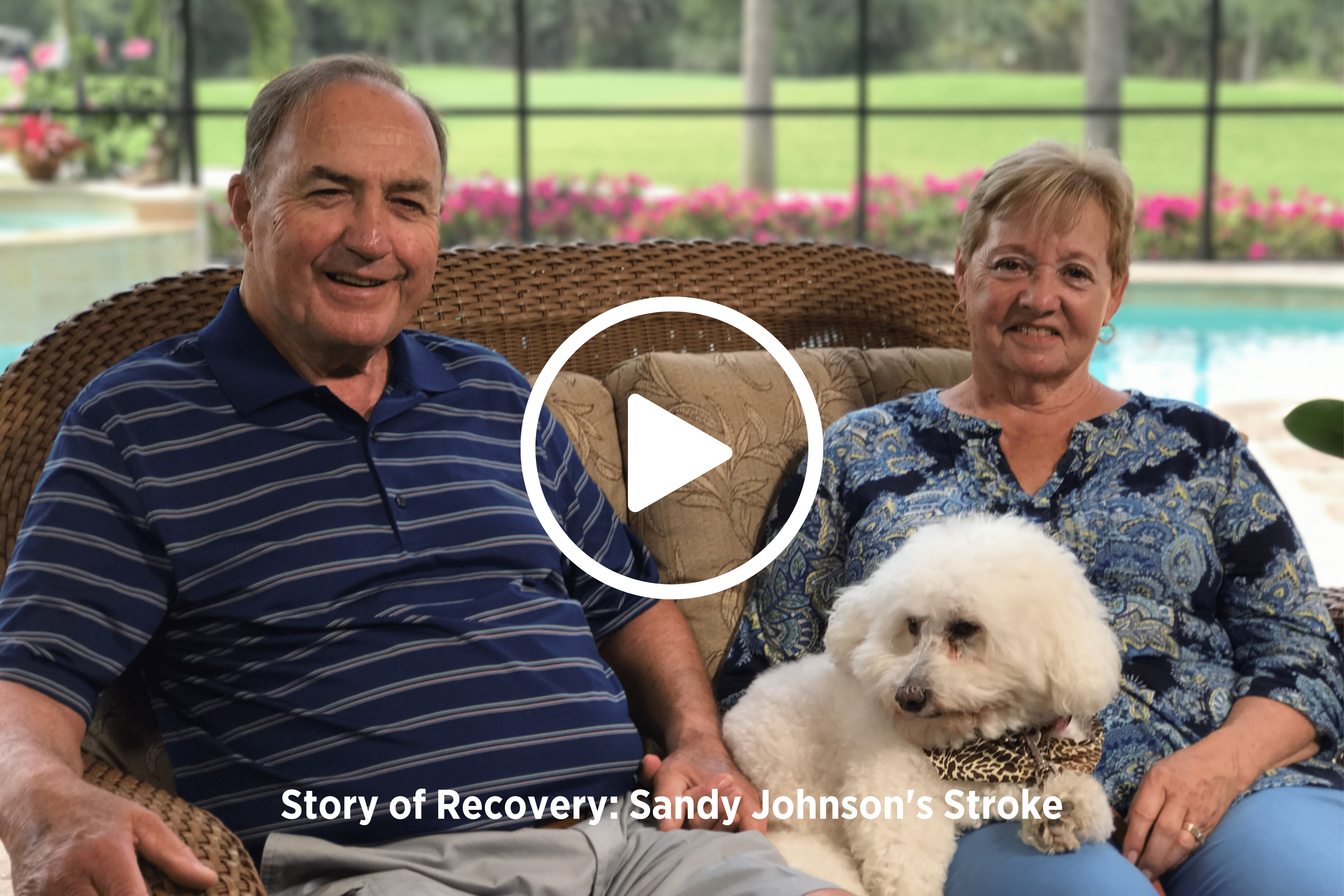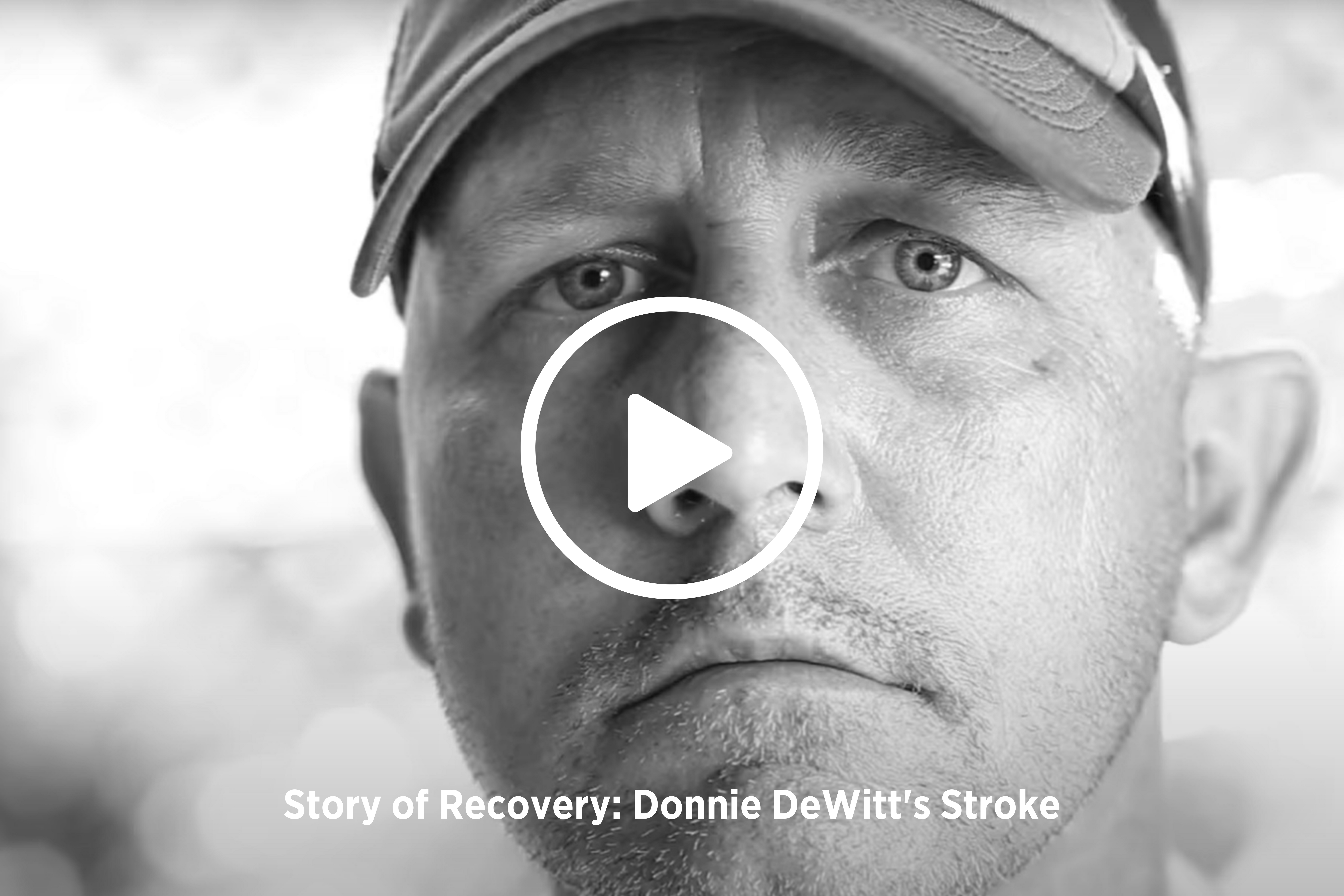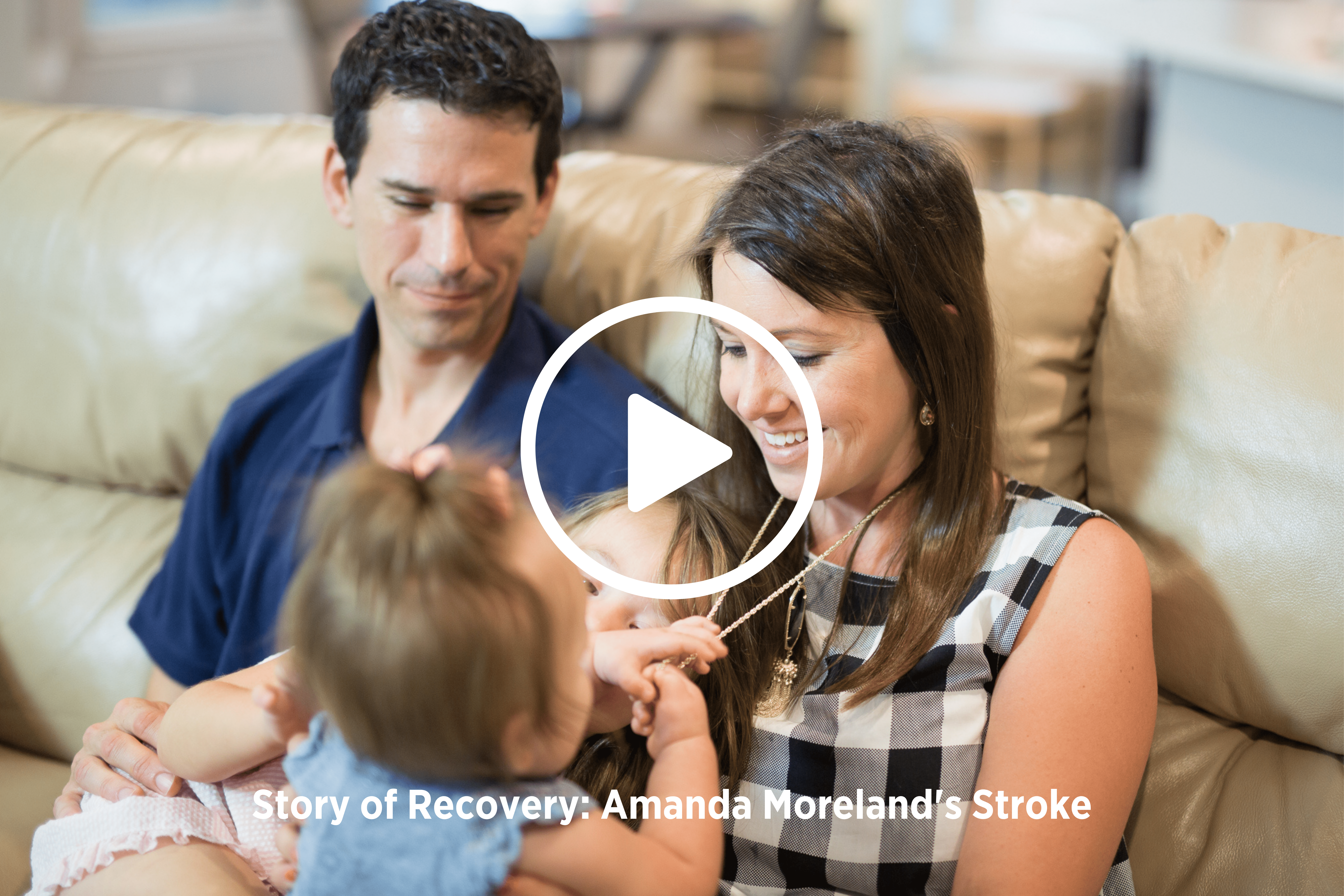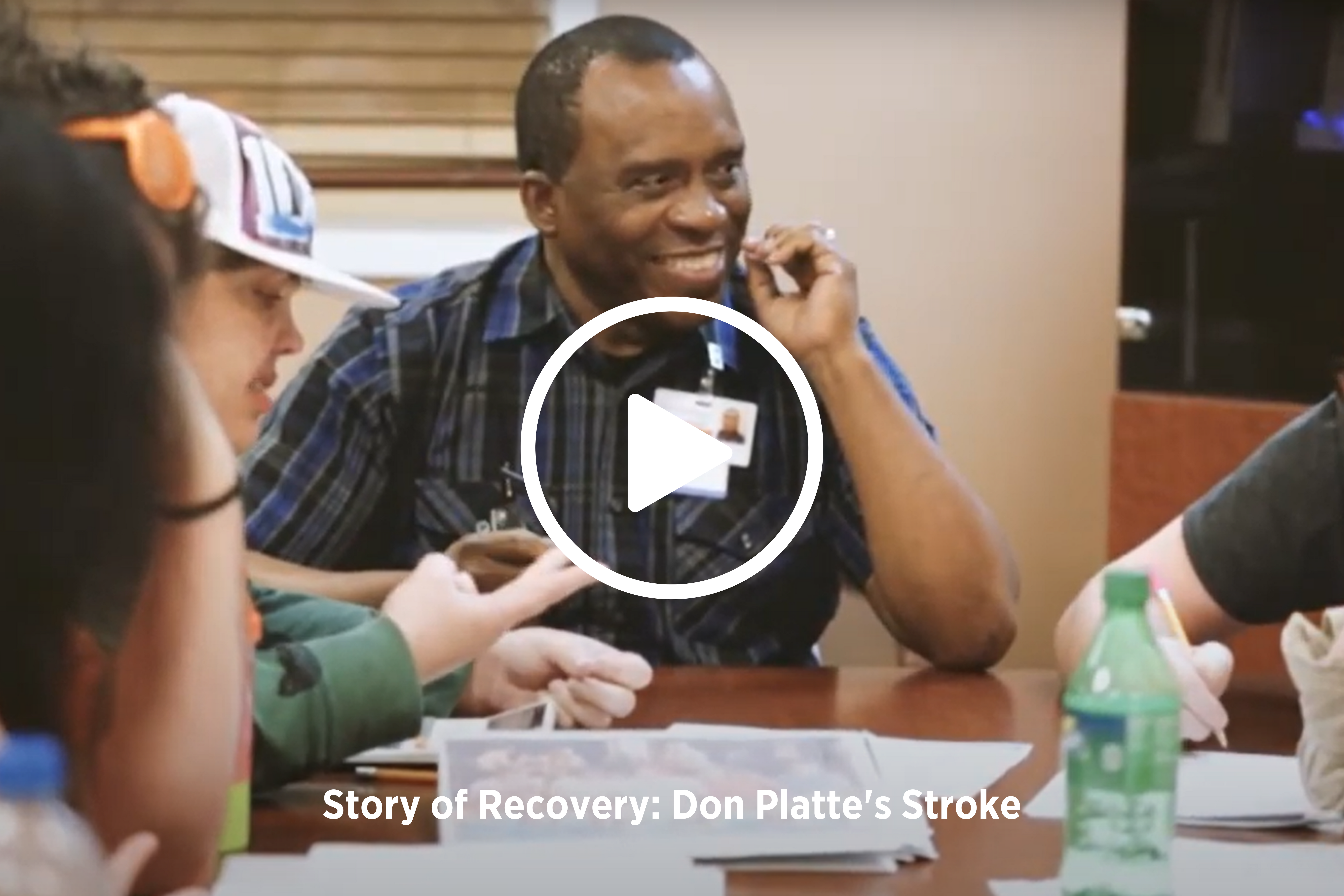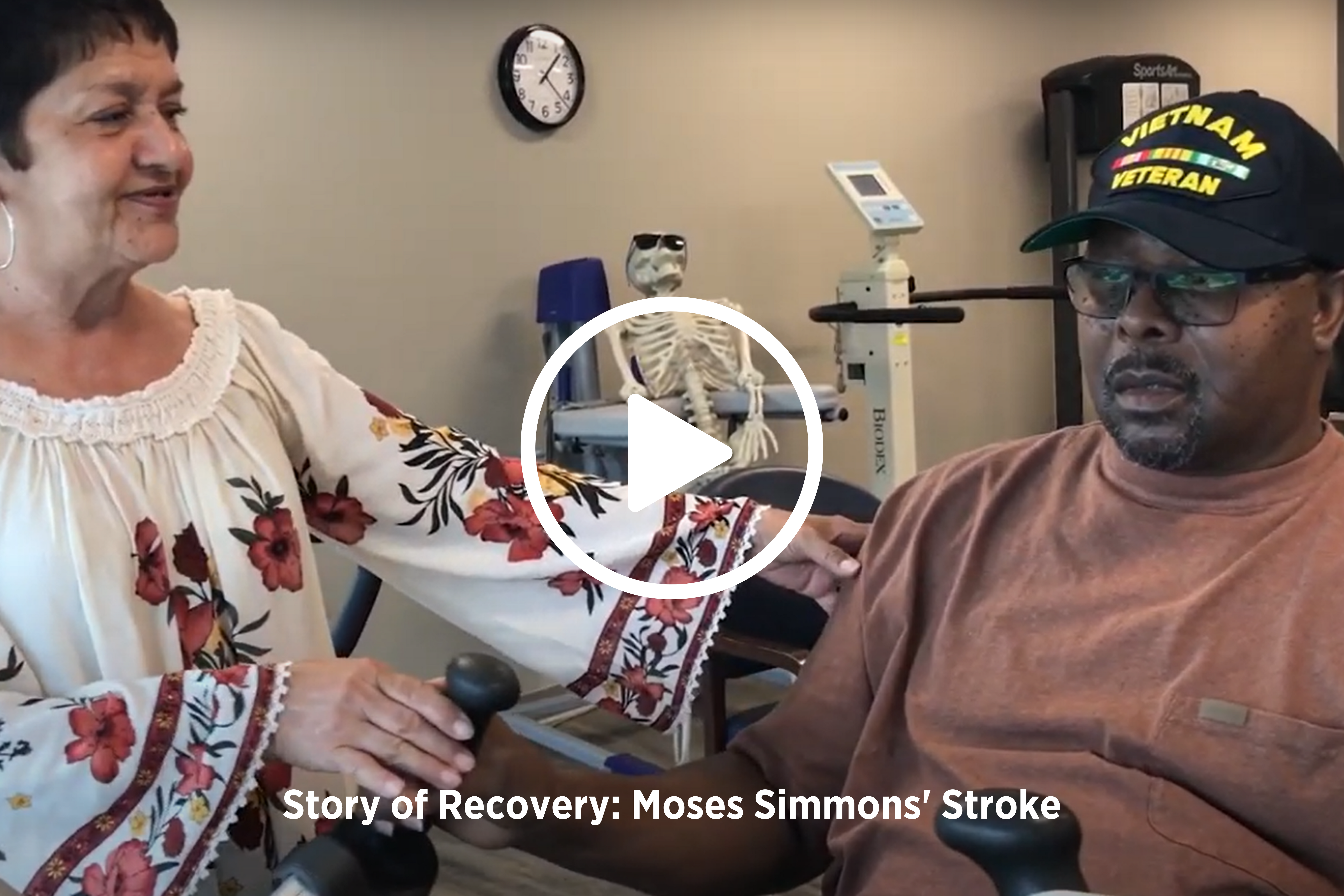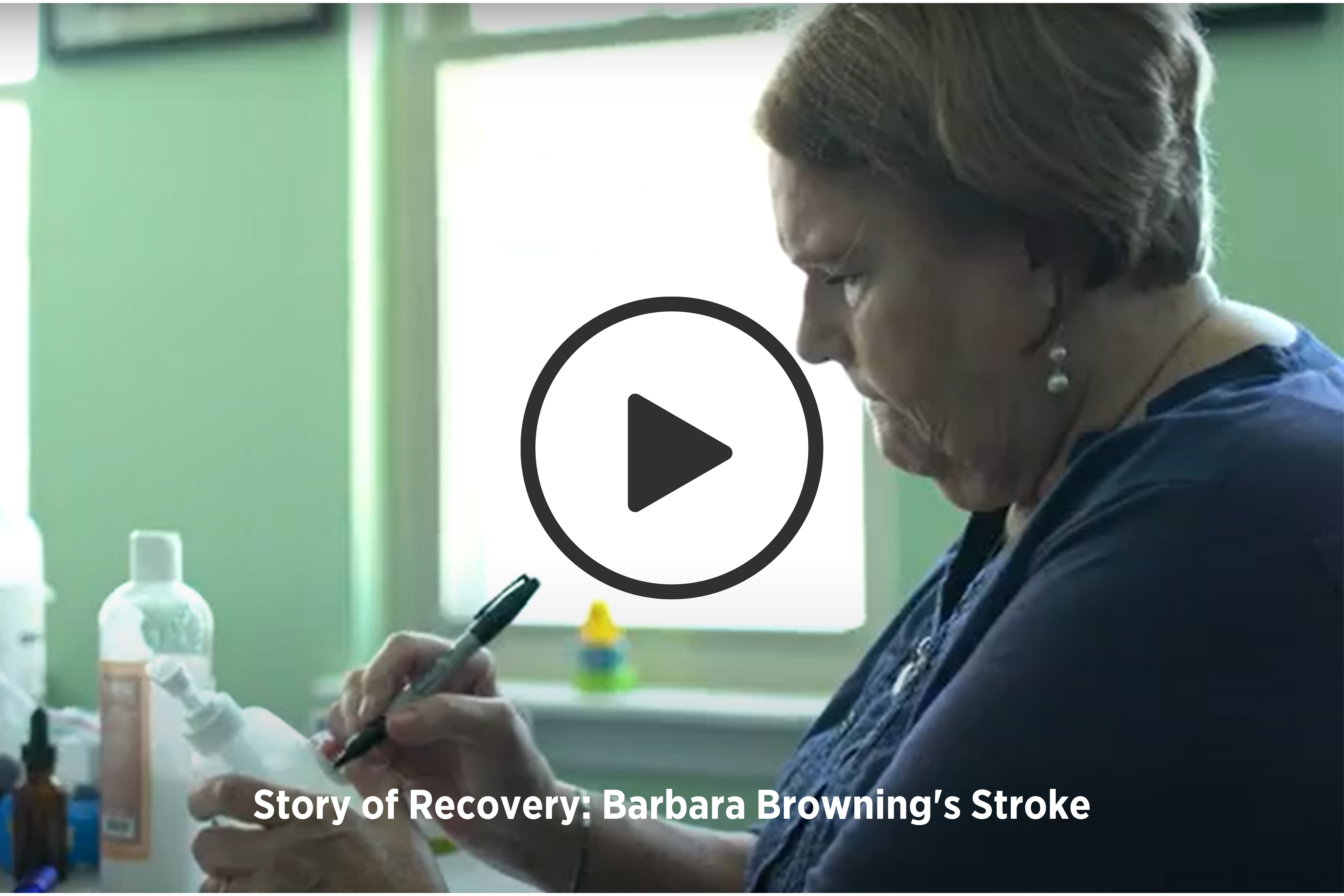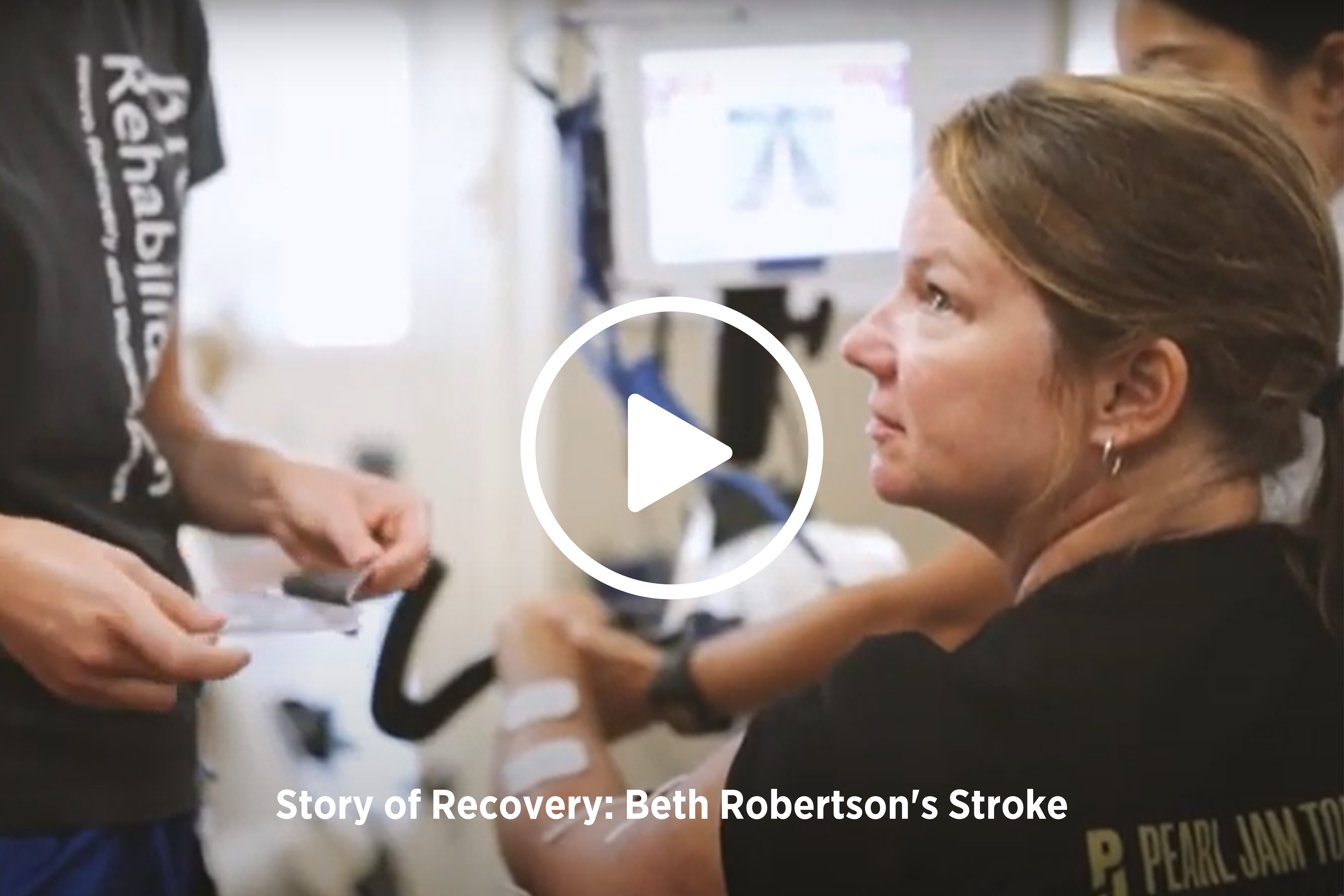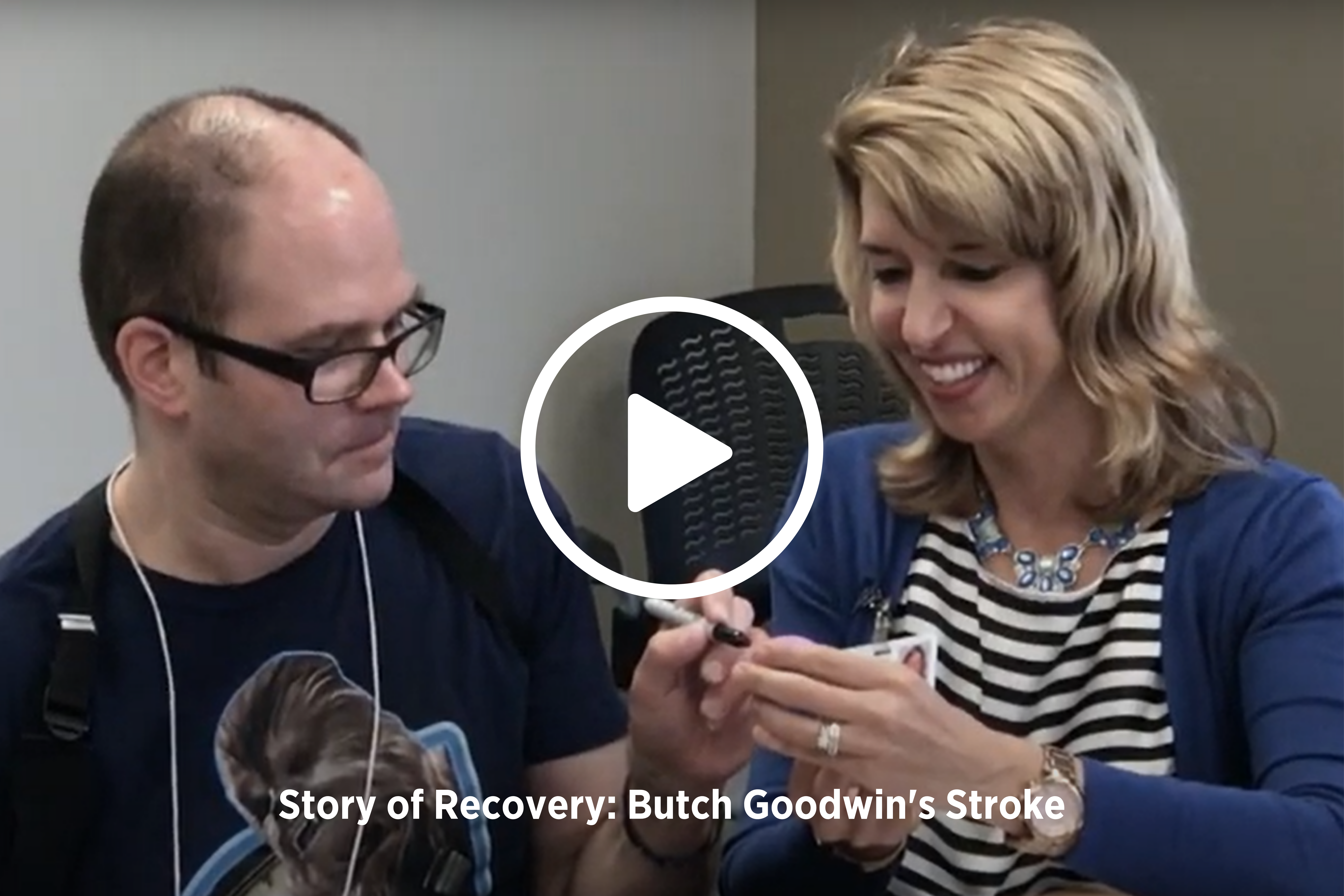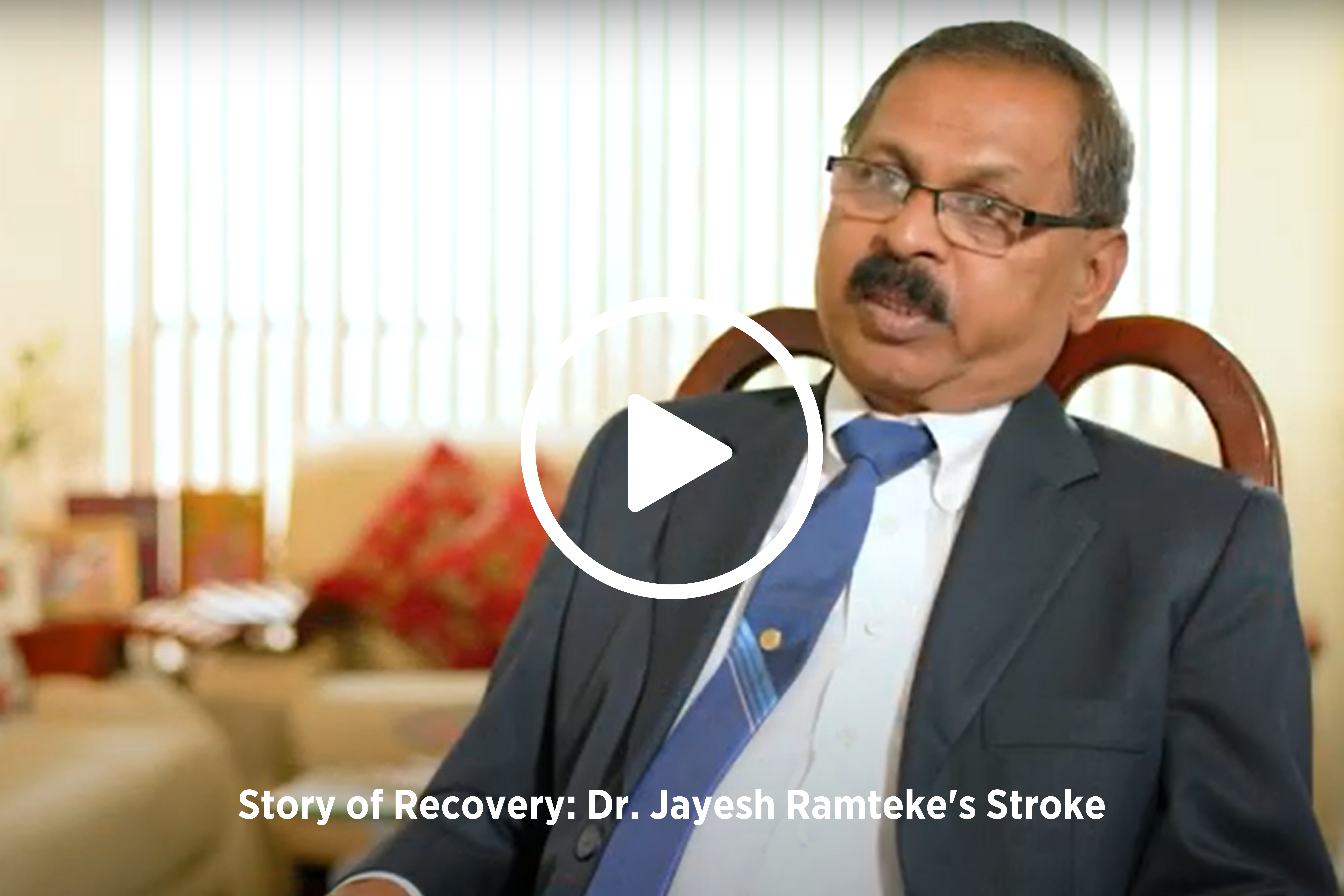On this page:
Why Choose Brooks?
Brooks Rehabilitation is a community leader in providing excellence in care throughout our healthcare system, and has received national recognition for our commitment to providing cutting-edge technology, forward-thinking research and continuing education and training. Annually, we help more than 500* stroke survivors and their families achieve their goals and rebuild their lives through our Brooks system of care. This places us as the number one stroke rehabilitation provider in Florida and the southeastern US, and in the top ten in the nation.
We recognize that each and every stroke survivor is unique with specific needs and goals, which is why Brooks Rehabilitation will provide you with a customized rehab team. Together, with our team, you and your family will develop a personalized care plan and goals so we may best support you. All our patients, family and caregivers will have access to hands-on training with expert clinicians, educational classes with clinical specialists, interactive patient room TV education, system caregiver support groups and psychologist-supported counseling, and educational hand-outs.
Our stroke program allows patients to achieve their greatest possible outcomes by utilizing technology paired with intensive evidence-based therapy provided by expert clinicians. At our state-of-the-art facilities, we use the most innovative technology available in the country, including motion assisted technology, functional electrical stimulation, virtual reality systems, body weight support and overground gait training systems, biofeedback systems, and Hybrid Assisted Limb technology (HAL). Through our Brooks Institute of Higher Learning, we offer world-class educational opportunities to the local and regional healthcare community and boast of a nationally recognized clinical residency program. Our program has an array of clinical specialists including neurological residents, specialists in lymphedema, wound care, gait training, technology, vision, orthopedic consults, wheelchairs and adaptive technology.
Our treatment for stroke involves patients’ caregivers and family right from the start. By including these critical partners early in a patient’s recovery, our staff of nurses and therapists can help set proper expectations, understand the goals of caregivers and family members, and help train these individuals properly to support their loved one in continued recovery, long after discharge from the hospital.
At Brooks Rehabilitation our mission is to serve our community, provide high quality care and facilitate continual growth and advancement in the field of stroke rehabilitation. When you begin your recovery journey with us, we want you to know that you are a part of our community. Here, patients come first. Here, our expertise doesn’t overshadow our humanity. We are here to help because it’s what we love to do. Brooks is with you, every step of the way.
Learn more about where stroke rehabilitation takes place.
*Medicare patients
Stroke Rehabilitation Program
At Brooks Rehabilitation, our Stroke Rehabilitation Program takes place in a variety of settings depending on the severity of stroke and the recovery phase of the patient. After a stroke we recognize that timing is crucial, so our goal is to get your rehabilitation started as soon as possible and continue to support you throughout your entire journey. We offer several innovative programs and technologies to empower you to achieve your highest level of recovery and improve your quality of life.
Physical therapy
Our physical therapy programs for stroke recovery focus on ambulation. Helping patients go from sitting to standing, make transfers from one location to another (like out of a car or into a bed), and become ultimately mobile — with or without assistive technology — is the typical aim. Treatment for stroke also includes a cardiovascular component to protect against cardiovascular diseases associated with stroke.
Technology-assisted therapy
As a regional leader in rehabilitation for over 35 years, Brooks Rehabilitation is focused on using state-of-the-art technologies and innovative, research-based practices to provide our patients with the best possible care. After a stroke, our expert clinicians will evaluate your needs and determine which technologies can be used to provide you with task-specific exercise and activities that are both repetitive and intense enough to cause neuroplastic changes in your brain.
- Hybrid Plus Program: We recognize that neuro-recovery takes a lot of time and hard work, and so our goal is to provide therapy in the inpatient rehabilitation setting that can be continued all the way to outpatient rehabilitation. To support this, our Hybrid Plus Program is designed to bridge the gap from inpatient rehabilitation to outpatient by offering structured cognitive and exercise-based programs. Our Hybrid Plus program utilizes a variety of technologies including functional electrical stimulation, virtual reality, and computer/tablet applications and games to maximize your recovery. We utilize an ergonomic exoskeleton with integrated springs and computer-based games to simulate functional activities in a 3D workspace, bringing your stroke treatment into the 21st century. Furthermore, the Hybrid Plus program allows patients to have more control over their own recovery process by offering supplemental therapy time at each individual’s discretion. Not only can patients take extra time utilizing some of the most advanced supporting technology, but they can also take time for cognitive training with practical tasks, like menu planning, creating presentations, balancing checkbooks, and more.
- FES Bike: Functional electrical stimulation of the peripheral nerves along with the patterned movement of the FES bike allows your muscles to work even if you have limited or no muscle control due to a stroke. This can promote blood flow, cardiovascular training, and additional sensation recovery.
- Body weight support: This stroke treatment utilizes a body harness that is worn by the patient and suspended from the ceiling and/or body weight support device. Body weight support allows for a percentage of ones weight to constantly be offloaded by the device in order to create a permissive environment for challenging activities such as walking, jumping, and squatting.
- Cognitive Lab: This is a computer and tablet-based lab with interactive software and applications to challenge and improve cognition and communication.
- Circuit Training: This training is a combination of strength, balance, and endurance activities that are individually prescribed to promote neurorecovery after a stroke.
- Exoskeletons: These are robots worn by patients that assist them to walk by providing mechanical assistance. This assistance allows patients to take larger, more consistent steps in order to accelerate motor learning after a stroke. The Armeo Spring is one specific exoskeleton that focuses on upper limb recovery, and is most widely used in stroke recovery.
Research Study Opportunities
The Brooks Clinical Research Center features a robust Neuromuscular Research Program focused on developing effective treatments for individuals with neurological disorders. The Neuromuscular Research Program is led by nationally recognized experts who are part of the collaboration between Brooks and the University of Florida (Brooks/UF-PHHP Research Collaboration). Opportunities are available for patients and community members to participate in studies aimed at improving health and mobility, walking recovery, and respiratory function after stroke. Typically, your care team will recommend you for a study based on your individual experience.
Learn about opportunities to participate in our research.
Cognitive and emotional therapy
Beyond the physical demands of stroke treatment, there are mental demands, too. That’s why Brooks offers extensive support via cognitive and emotional therapy. If a patient has a history of anxiety or depression, a stroke can amplify this, so Brooks has resources on hand to work with patients and highlight improvements they’re making each day. Recovery from stroke can take time, so maintaining a positive attitude and commitment to the rehabilitation process is paramount for patients’ success.
Expert Stroke Team
Depending on where you are in your recovery process and what your needs are, the members of your individualized stroke team may vary. Regardless of who is involved, our team members will work closely together throughout your stroke rehabilitation to ensure your needs are met. Our team is constantly communicating through meetings, huddles, and emails to ensure you receive the best and most cohesive care possible.
Physical needs specialists
Physicians
At Brooks Rehabilitation, our Physical Medicine and Rehabilitation Physicians are the leaders of the stroke team. Our physicians provide evidence-based treatments with special consideration of the individual needs of each patient. As team leaders, our physicians will maintain communication with you and the rehabilitation team in order to make informed decisions regarding your care. Our physicians’ number one goal is your continued success and recovery from stroke, and they will work diligently to ensure that you achieve the greatest outcome possible.
Rehabilitation nurses
Our Rehabilitation Nurses work closely with all of our patients, their families, and their caregivers soon after the onset of a stroke in order to restore patients’ freedom and Independence. Our nurses collaborate closely with an interdisciplinary team to help patients and their families develop and work towards goals that maximize recovery. Our nurses are highly trained to safely handle all patients regardless of their impairments, working closely as a part of the interdisciplinary team to train family and caregivers.
Additionally, our nurses use a holistic approach where strong consideration is made of the physical, emotional, and social wellbeing of our patients in an effort to prevent further complications. As an example, our nurses are trained to recognize pressure injuries, and in cases where patients have pre-existing wounds, our certified wound care nurses are consulted to determine the proper course of treatment. Coping with a stroke can be very difficult for both the patient and their caregivers. Our nurses guide patients and families through the grieving process, since emotional wellbeing is such an important part of health. Our nurses are focused on our patients’ wellbeing, teaching independence to both the patient and family so that they can return home safely.
Physical Therapists
Our physical therapists work closely with all of our patients, their families, and their caregivers in all rehabilitation settings to establish goals and provide therapy plans. Regardless of the setting, our physical therapists always begin with a thorough neurological evaluation that assesses the patient’s neurological impairments, their function, and their current level of participation in everyday life. Based on the evaluation, our therapists then create an individualized treatment plan for patients in order to help them achieve their goals and get back to their life.
- Gait training: Many of our patients are unable to walk or have difficulties with walking when our physical therapists begin working with them after a stroke. As a result, our physical therapists are highly trained in hands-on facilitation for gait training so that they can assist patients to walk with support. At Brooks, our therapists have access to state-of-the-art equipment that allows them to practice safe walking with any patient regardless of their level of function.
- Balance Training: Difficulties with balance are very common after stroke and improving balance is crucial to avoid falls, which can lead to further injury and disability. At Brooks, all of our stroke therapists are trained to evaluate and treat balance impairments in order to decrease the risk of falls and help patients achieve their prior level of function. Additionally, in cases where balance impairments may be more complicated, Brooks has an outpatient Balance Center where patients can be referred as needed.
- Bed Mobility and Transfer Training: Getting in and out of a bed or chair can be very difficult after a stroke. At Brooks, our therapists can teach you the skills and appropriate equipment to use in order to improve your independence and safety with getting out of bed and getting into your wheelchair, car, shower, etc. Additionally, in cases where patients remain unable to do these things on their own, our therapists can train family and caregivers how to safely assist the patient.
- Hobbies: After a stroke, it is very important that we get our patients back to doing the things that they love. Our physical therapists use a two-pronged approach to help patients return to their hobbies and activities. This approach involves promoting neurorecovery, with the goal of returning to prior level of function, while simultaneously providing the patient with the knowledge of safe adaptations that can be made to allow them to get back to doing the things they love as soon as possible.
Occupational therapists
Our team of occupational therapists provide comprehensive and holistic treatment to individuals following a stroke. Our occupational therapists perform extensive evaluations to gather information related to an individual’s routine, roles, and daily occupations, or the typical activities that an individual engages in every day.
Our therapists utilize a variety of resources and standardized outcome measures to identify and quantify specific deficits that limit an individual’s engagement in daily occupations as a result of a stroke. Additionally, our occupational therapists may provide specialized education on stroke recovery, introduce adaptive equipment and technology, or discuss alternative methods for completing tasks to further increase a patient’s independence and quality of life following a stroke.
All of our occupational therapists are highly skilled, stay up to date with technology, and advanced interventions in stroke rehabilitation, and they collaborate closely with the entire interdisciplinary rehabilitation team to provide quality and individualized care to every patient. To maximize safety and independence in the home, occupational therapists at BRH also provide recommendations regarding appropriate medical equipment and modifications to the home environment.
Cognitive Needs Specialists
Speech and language pathologists
A speech language pathologist is specially trained in providing rehabilitative cognitive communication-based exercises and personalized strategies. When we think about a patient’s recovery, we think of the big picture and what a person wants to get back to doing independently, not what we think that they want to do. In this way, we avoid a cookie-cutter approach to rehabilitation. When patients begin treatment, they are encouraged to describe their preferences and daily routines, which our speech therapists communicate with the rest of the team.
Communication
Speech language pathologists address patient goals of communicating how they feel, what they think, and interacting again with their loved ones. Our therapists are highly trained to help patients regain functional communication through specialized and individualized therapies that address aphasia, speech, and voice difficulties which frequently occur following a stroke. Aphasia is a medical term for impairment in understanding language or the ability to express language. The therapists engage the patient’s loved ones in supported communication® techniques to improve interpersonal communication as quickly as possible, and empower patients and their loved ones with the tools for communication success at home and throughout the Brooks continuum of care.
When appropriate, we collaborate and make referrals to our Brooks Aphasia Center, where patients can continue their journey in aphasia rehabilitation. High tech alternative and augmentative communication systems with eye gaze capability can assist loved ones in communicating messages when speech is non-functional. Our technology can also facilitate access to emails, social media, and the Internet to help patients feel connected again. Our iPad and desktop computer-assisted therapies can be accessed beyond our individual sessions in our Hybrid-Plus Communication and Cognition lab.
Swallowing
Speech language pathologists actively work to help individuals improve their swallow function in order to safely enjoy foods and liquids of their preference again. We offer specialized technologies in locations throughout our continuum of care that facilitate swallow recovery, such as non-invasive electrical stimulation and biofeedback devices for strengthening swallowing muscles, lips, and tongue. Advanced instrumental assessments of swallowing function through video fluoroscopy and fiberoptic endoscopic evaluation of swallowing (FEES) provide detailed information of a patient’s swallowing ability to enhance outcomes by guiding treatment. We provide hands-on training of swallowing techniques, exercises, and dietary modification recommendations because we strongly believe that including loved ones and caregivers in the recovery process is important for patients’ success in stroke rehabilitation.
Cognition (Thinking Skills)
Speech language pathologists can help bridge that important gap in regaining functional independence — cognition. Research indicates that patients improve their overall independence when cognition is addressed in their rehabilitation. Strokes commonly impact attention, memory, decision making, and safety awareness. When any of these areas are affected by stroke, integrating back into home and community life can present daily challenges.
The stroke rehabilitation process is person-centered, and we want to know everything we can to make patients feel like themselves again. Based on their goals, a speech language pathologist will address areas of thinking skills like attention, memory, and problem solving that may include managing medications, finances, and everyday household tasks such as grocery shopping and meal planning.
Social Workers and Case Managers
At Brooks Rehabilitation Hospital we have case managers with educational backgrounds in Social Work, Nursing and Rehab Counseling to assist our patients and caregivers to transition to the next level of care. The case manager role in the inpatient setting consists of meeting with patients and their caregivers to assess needs to create a safe discharge plan. The case manager is a significant part of the interdisciplinary team and works very closely with the physician to help determine which level of care is best for the next phase of stroke recovery.
Many of our patients will be discharging home, and community referrals such as home health nursing and therapies, private in-home care for custodial services, medical supplies including respiratory equipment, tube feeding, ramps, financial assistance, outpatient therapy and IV antibiotics are common services case managers coordinate.
Depending on the level of care needed, some stroke patients will require daily therapy and nursing. In this case, we refer to a skilled nursing facility like Brooks University Crossing or Brooks Bartram Crossing. Bartram and University Crossing have social workers who will continue assessing patients’ needs. In the skilled nursing setting, social workers make similar community referrals so patients can transition home safely. In some cases, stroke patients may have to transition to long-term care or Assisted Living. Social workers will support the patient and family with new placement.
For patients who return home with Home Health Care services, a social worker can provide assistance with reintegration into the community, promote Support Groups, and refer to a number of Brooks outpatient services such as Adaptive Sports and Recreation. When patients are no longer homebound, social workers coordinate the next phase of stroke recovery which includes the Neuro Recovery Center, Brain Injury Clubhouse, Aphasia Center, Brooks Independent Gym Program and becoming a stroke mentor or volunteer.
Psychologists
Psychological services are available to help patients and family cope and adjust to illness or injury. As an integrated team member, the psychologist provides intervention to support the overall goal of increasing function and quality of life for persons following an injury or illness.
Neuropsychological services are available to help the patient, family or care provider, and rehabilitation team better understand the thinking skills, emotional functioning, and behaviors following an injury or an illness. Clinical neuropsychologists also provide therapeutic consultation to patients and families in need of education and emotional support concerning their neurological injuries or illness.
Therapeutic recreation specialists
A Certified Therapeutic Recreation Specialist (CTRS) delivers direct patient care using recreation and leisure activities as the primary modality, with a goal of health restoration, remediation, and rehabilitation for persons with limited functional abilities due to a stroke. Recreation therapy is the purposeful use of recreation and activity interventions to improve a patient’s functioning, after the onset of a stroke, in the following domains: physical, emotional, social, cognitive, spiritual, and leisure.
Our Therapeutic Recreation Specialists promote overall health and well-being through recreation and leisure activities. The recreation therapy staff work very closely alongside the stroke rehabilitation team to meet each patient’s individual goals throughout their stay with us.
Services offered by Therapeutic Recreation Specialists:
- Arts and crafts
- Aquatic therapy
- Adaptive sports
- Cards and board games
- Computers (Including eye-gaze system, touch screen computer, iPad)
- Cooking and baking
- Exercise and sports
- Gardening and yard work
- Music
- Outdoor Activities (including putt-putt and yard games)
- Community reintegration outings
- Pet therapy
- Reading and writing
- Trikes and hand cycles
- Scavenger hunts
- Video games (Wii, Xbox)
Vocational counselors
Vocational Counselors at the Brooks Clubhouse can help you understand your capabilities and develop appropriate career goals. We can assist with a variety of services designed to help you keep or find a new job and help to ensure you are employment-ready. Some of these services include resume building, interview skills, job development (finding a job), placement services, and onsite job coaching. We work in collaboration with the local State Vocational Rehabilitation offices. To get started, contact Brooks Clubhouse Vocational Office at (904) 394-1697.

